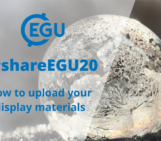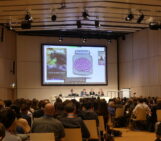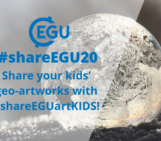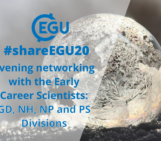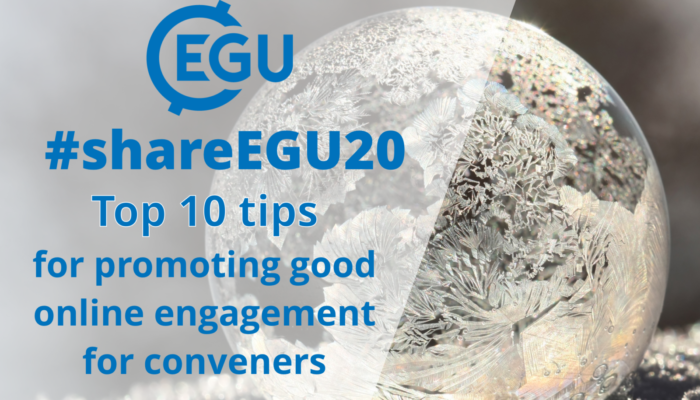
So, you’ve taken the plunge – you have decided to upload your materials as an author, or committed to hosting your session with your fellow conveners, or perhaps started to add sessions to your personal programme as a participant. What comes next? Interacting with other researchers using one of our new platforms!
During the next two weeks we will post more information about what those platforms will look like and what to expect from them. But this week we are focusing on online behaviour. So today we are talking about tips for conveners for promoting positive engagement.
Conveners at #shareEGU20 are just as important as they are during the physical meeting in Vienna! You can participate with the presenters in your session both by commenting on uploaded presentation materials and by facilitating the live session text-chats. But whilst many of you will be familiar with effective methods of engaging with people in person at a physical conference, you might feel nervous about engaging with people successfully online.
First things first: don’t worry! We have selected our ‘Top 10 Tips’ to help you manage digital interactions during Sharing Geoscience Online and also provided links to additional resources for those who want to delve in further. We also know there are a wealth of resources out there, so if you have additional tips or advice, please add them in the comments below.
Top 10 Tips for promoting good engagement at #shareEGU20:
- Have a session plan: check through your list of abstract authors. Who has already uploaded materials? What are their key points, and how can you link them together?
- Post a schedule of speakers: this is especially useful if you know that some of your speakers have not yet responded to the requests to upload. Put the authors you know are taking part at the beginning to help your session build momentum.
- Set the expectations: At the start of your session, be sure to briefly mention which topics you hope will be covered and how long each author will be given to discuss their display. Also encourage your authors to share information about how to reach them outside of the chat so people can continue the discussion later.
- Plan an introduction for each display: introduce your presenters, or ask them introduce themselves and advise abstract authors to keep their display introductions short; perhaps even typing them out in advance. Suggest that all speakers end the introduction of their material with one central point to start the discussion.
- Prepare some questions: Have at least one question ready for each presenter even if they haven’t added materials to their display and are just showing an abstract. You should assume everyone will participate.
- Let the discussion flow naturally: don’t feel like you MUST drive the discussion. Sometimes it is better just to sit back and let the interactions flow.
- Try a quiz or poll: why not try adding a poll or quiz to increase engagement? You can even link to an external poll like mentimeter.
- Provide closure: Plan an exit strategy: when the discussion has finished, or your time is running short, how do you plan to end the session on a high note?
- Zero-tolerance for abuse: as a convener, it is your responsibility to protect the authors and participants in your chat from disruptions or abuse, just as you would during the physical General Assembly in Vienna. More information will made available about proceedures for this during the week immediately before #shareEGU20, on the www.egu2020.eu website.
- Double the fun: If you are a convener, ensure that you have at least one other person helping you serve as a moderator. This is important for identifying and dealing with any abusive or disruptive behaviour as well as giving you more time to enjoy the session.
If you are concerned about the number of people participating in a chat, don’t forget the 1-9-90 rule of online interaction (1% of people create, 9% interact, 90% lurk). There are probably more people engaged than you can see commenting or in the chat, so don’t worry and enjoy the interaction with the people who are participating.
Worried about managing abusive behaviour?
Abusive behaviour (trolling, harassment and, in general, not following the EGU’s Code of Conduct) WILL NOT BE TOLERATED on our platforms. More information on the procedures for reporting and removal of those who do not follow these guidelines will be available in the week prior to Sharing Geoscience Online on the www.egu2020.eu website.
If you are still feeling nervous, why not check out something with a somewhat similar format like twitter chats! These are large, open access chats hosted in the open platform of Twitter and focussed around a central idea or speaker. It can be a good way of picking up some methods of interacting online in this way and still having fun.
We are so much looking forward to seeing all of you online, discussing your research in an open and constructive way. For more information about comments and chats, please see the resources listed below.
Tune in next week for tips for participants of #shareEGU20!
Useful links:
This is a long read, but an excellent resource about moderating comments:
Resources for content design:
https://elearningindustry.com/enhance-online-training-experience-learners
https://www.participate.com/blog/building-community-in-a-time-of-coronavirus
https://elearningindustry.com/text-in-an-online-world-read
Resources to combat zoombombing and for online security:
https://nakedsecurity.sophos.com/2020/04/03/5-things-you-can-do-today-to-make-zooming-safer/
Due to the ongoing coronavirus outbreak, EGU has made the decision to cancel this year’s physical General Assembly in Vienna and instead offer a partial alternative meeting online, called #shareEGU20. Over the next few weeks in the run up to #shareEGU20, which will be held from the 4 – 8 May 2020, we will be posting regular updates and information about how to get involved, what EGU can offer during this week and how to find each other. We know that there will be many, many questions that people have, and we are learning how to do this right along with you, so please send us your questions over social media or by emailing egu2020@copernicus.org or communications@egu.eu. We’re looking forward to sharing EGU with you, online!

